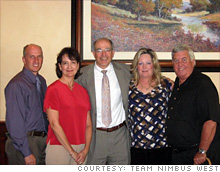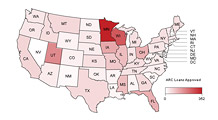Small business ARC loans pick up, but frustrations remain
The SBA's emergency loan program is ramping up, but not fast enough to keep small business owners happy.
 |
| Members of Team Nimbus West. From left to right: Darin Ray, Diane Blakeman (CEO), Chuck Blakeman (President), Susan Kildahl, John Nordlander. |
NEW YORK (CNNMoney.com) -- A government effort to get badly needed cash into the hands of struggling small business owners is slowly gaining momentum, but entrepreneurs seeking the scarce loans are still in for a frustrating ride.
Dubbed "America's Recovery Capital" (ARC) and created as part of the stimulus package, the program offers short-term, zero-interest loans to qualifying small businesses hurt by the recession. Since launching in early June, the ARC loan program has backed 2,715 loans totaling just over $88 million, with an average loan size of $32,425, according to the latest data from the Small Business Administration.
That's a sharp pickup from where the ARC program stood last month, when it had 400 participating lenders and around 1,000 completed loans.
But applicants say they still face daunting obstacles in their attempts to land a loan. Their biggest gripe: Lenders -- especially big, megabank-type lenders -- have been slow to get on board. For banks, the ARC program involves much paperwork for loans that generate relatively little profit. Consequently, many are steering clear.
The SBA's largest lender, Wells Fargo (WFC, Fortune 500), is issuing ARC loans, but its second-biggest financer, U.S. Bank (USB, Fortune 500), is taking a pass.
"We have opted not to participate in the ARC program," Jennifer Wendt, spokeswomen for U.S. Bank, said in an e-mail. "We are confident that our customers' needs can be met with the programs we currently offer, both through the SBA and through our small business banking group."
After taking more than three months to study the ARC loan program, Bank of America (BAC, Fortune 500) has finally decided to get on board. "Our intent is to participate, but we are finalizing the details on how we will implement it," Bank of America spokeswoman Anne Pace said. The bank hasn't yet set a timeline for when it will begin accepting ARC applications.
The SBA anticipated this delay from larger banks, which need time to create systems that will work across hundreds or thousands of branch offices. But the creeping pace is making small business owners -- who need cash quickly -- very annoyed.
Wall Street vs. Main Street: Business owners really bring out the pitchforks when they consider the speed with which billions of dollars were distributed to large Wall Street firms and banks.
"That is what sticks in the small business owner's throat more than anything," said Chuck Blakeman, president of Team Nimbus West, a Denver-based small business advisory firm.
Through his blog and Twitter feed, Blakeman stays in regular contact with thousands of business owners, and ARC loan gripes have been a common discussion topic. Blakeman has experienced the frustration firsthand: He's applied for an ARC loan for his own company, which has two full time employees and several part-time staffers.
"It was supposed to be able to be something for business owners in distress, but business owners in distress aren't going to be able to touch this loan," Blakeman said. "I sent in 301 pages of background information, and I have not yet heard back from Wells Fargo" -- a bank he has a 20-year relationship with.
Due South Publishing owner Mack Sullivan's ARC loan odyssey illustrates the hoops applicants have to jump through. Sullivan had a relationship with Bank of America for years, and submitted to them an ARC loan application for his tourism literature company, based in St. Simons Island, Ga. At the time, Bank of America had not decided whether it would participate in the program at all.
After months of searching, Sullivan found that A BB&T (BBT, Fortune 500) branch in Georgia finally that would acceptaccepted his application -- with conditions. "I met with the local branch of BB&T last week and had a good meeting," said Sullivan. "They are participating, but with the provisos that you become a customer and, interestingly, have a loan with their bank other than the ARC loan," he said.
Sullivan was the first person to submit an ARC loan application for an ARC loan at his local BB&T branch. He is still waiting for a final word on the status of his ARC loan, and hopes to hear within the next few weeks.
'One tool in the toolbox': The SBA anticipated many of these challenges and criticisms. Agency executives are quick to point out that the ARC program is -- by Congressional mandate -- an extremely narrow initiative, one that isn't designed to aid the majority of America's 6 million small businesses.
"We have been averaging about 50 new lenders into the program each week and a little over 220 loans approved each week, and those numbers continue to grow," said Jonathan Swain, the SBA's assistant administrator for communications. "For a brand-new program -- a program that is very different from any other program SBA has done -- we feel those numbers are encouraging."
ARC loans are a sweetheart deal for those who qualify. The program offers up to $35,000, distributed over several months, that can be used to pay down other debts, such as credit card or mortgage bills. The government covers the loan's interest, making it interest-free to borrowers, and offers banks a 100% guarantee -- if the business defaults, the government will pay the bank back. Business owners don't need to start repaying the loan for a year. The goal is to provide small business owners with a way to keep up with their bills until they can get back on their feet.
But because the program is so generous, it's also very selective. Borrowers have to be running a "viable" business, which the SBA defines as one that has been around for at least two years and been profitable in at least one of the last two years. They also have to be experiencing clear financial hardship, as illustrated by a sharp drop in sales, staff, or working capital. (To learn more about ARC eligibility, see "ARC loans: How they work.")
"The way I would characterize it is that it is one tool in the tool box," Swain said of the ARC program. "It is a very small loan program for a very targeted, very specific situation, as a result of the economy."
Congress trying to simplify: In response to the small business backlash, though, some in Congress are already eying ways to expand and simplify the program.
In the Recovery Act, Congress included a restriction forbidding borrowers from using ARC loans to pay down previous SBA loans. Last week, as part of a broader bill extending several about-to-expire SBA programs, the House of Representatives lifted that restriction. However, the Senate stripped it back out of the version of the extension bill that it passed.
"To get the extension passed through quickly was the main goal," said Richard Carbo, deputy press secretary for the Senate Committee. The Senate may consider the ARC expansion later, he said.
Nydia M. Vel�zquez, D-N.Y, chair of the House Committee on Small Business, is pressing for other ARC changes as well.
"The SBA should streamline its application and approval processes," Vel�zquez said on the House floor last week. "Businesses that apply for these loans do so because they need a lifeline -- now. The SBA should make the process fast and simple."
The SBA is between a rock and a hard place, though. Stringent standards for ARC loans alienate the business owners the loans are intended to help. On the other hand, if the agency loosens its standards, default rates could soar, upsetting the taxpayers whose cash is funding the program.
"One of the things that we were working hard to balance was the obligation to be good stewards of the dollars that support the program with the urgency and need to get these dollars in the hands of small businesses," the SBA's Swain said.
But out on Main Street, business owners remain irked that of the billions risked on government bailouts, little has flowed their way.
"The dichotomy between the treatment of the small business person and the big business person is probably the most difficult for anyone to swallow," Blakeman said.
We want to hear about the most outrageous consumer rip offs and unbelievable price gouging that you've come across. E-mail your story to julianne.pepitone@turner.com and you could be part of an upcoming article. For the CNNMoney.com Comment Policy, click here. ![]()
-
The Cheesecake Factory created smaller portions to survive the downturn. Play
-
A breeder of award-winning marijuana seeds is following the money and heading to the U.S. More
-
Most small businesses die within five years, but Amish businesses have a survival rate north of 90%. More
-
The 10 most popular franchise brands over the past decade -- and their failure rates. More
-
These firms are the last left in America making iconic products now in their twilight. More











